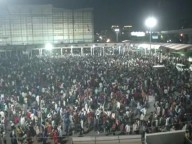
Lucknow, Malls and markets are empty, roads are mostly barren but bus stations, railway stations and even railway tracks are brimming with activity in Uttar Pradesh.
Thousands of workers and laborers- now in a reverse migration mode-are desperate to reach home amidst the COVID-19 scare.
Since the past two days, people are flocking on the UP-Delhi-Haryana border and also on the UP-Bihar border to return to their homes in UP.
With the railway also a part of the lockdown, people in other states, particularly Maharashtra, are climbing on to goods train, oil tankers and even milk tankers in an attempt to reach their destination.
With limited options left for travel, many are walking the distance on foot.
UPSRTC Managing Director Raj Shekhar said, "We have deployed 1,000 buses to bring stranded migrants from the border areas as well as railway stations and bus stations. The buses have taken the people to Kanpur, Ballia, Varanasi, Gorakhpur, Azamgarh, Faizabad, Basti, Pratapgarh, Sultanpur, Amethi, Rae Bareli, Gonda, Etawah, Bahraich and Shravasti. We are also trying to provide food and water to them."
Sunil Kumar, who has been waiting for 38 hours for a bus at the Kaiserbagh railway station in Lucknow to reach his home in Azamgarh, finally started walking on Saturday evening with his two cousins.
All three of them work in a garment unit in Noida.
"Baithe rahenge to mar jayenge (If we keep waiting, we will die)," he said and added that he had his cousins had run out of money because they travelled on a truck and had to pay the driver.
He said that hundreds are waiting at the bus stations, waiting for their turn because buses are limited.
What is adding to the panic among laborers and workers in reverse migration, are rumors that the lockdown could be extended to another month or so.
Ikhlaq, who has returned from Bihar and is presently in Varanasi, trying to find a way to reach his home in Amroha, said, "I have been told by my friends and also my boss in Patna that the lockdown will continue till May. I want to reach my home and will not take a lift on the way or just walk back."
Ikhlaq works in a travel agency and said that, in any case, there would be no work in the sector for months.
Ikhlaq said that while four-wheelers did not stop on the highway to offer lifts to migrants, people on motorbikes were more generous.
I took three lifts from Patna to Varanasi and did not even see the faces of the motorcyclists because they were wearing helmets but they brought me till here," he said.
However, many of the migrants who are walking long distances to reach their homes, are also complaining of police atrocities.
"Without even batting an eyelid or asking a question, the cops have rained lathis on us as we walked from Unnao to Barabanki," said a student from IIT, Kanpur.
He and his four friends had managed to get a lift from Kanpur to Unnao but had to walk the remaining distance of about 98 kilometers.
"We were beaten and then made to lie prostrate on the ground. When we showed our ID cards to the cops, we were allowed to move on," he said and added that it took the group three days to reach home on Saturday.
Most of the migrants who are returning home on foot, are also the ones who are escaping thermal screening.
A senior official said that laborers and workers are walking through the fields and it is near impossible to keep count.
The Varanasi division has been most affected by reverse migration and people are heading to their homes in Jaunpur, Ghazipur, Chandauli and Varanasi.
The government spokesman said that they have identified most of them and have now alerted gram pradhans, ASHA workers, ANMs (auxiliary nurse midwife) and local primary health centres to identify those who have returned and ask them to self-isolate themselves for the next 14 days.
Over 30,000 people are said to have arrived from Maharashtra alone on at least 80 trains before the lockdown began.


.jpeg)

